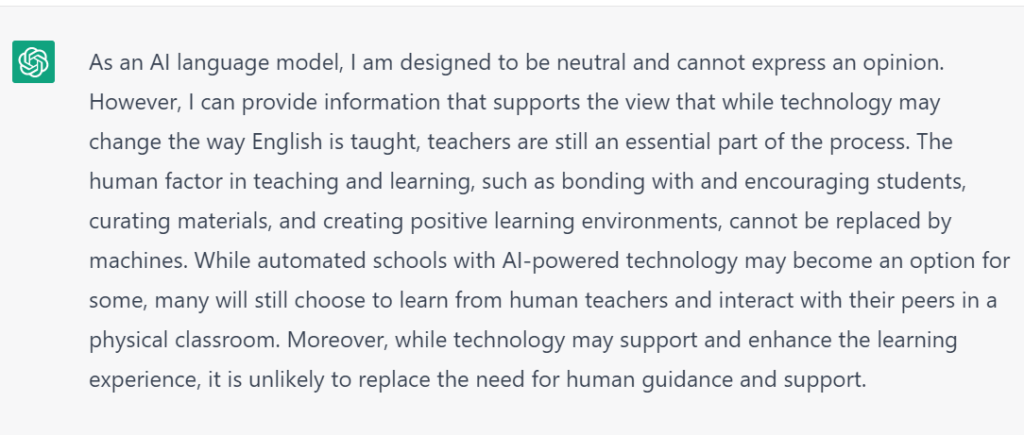
It was 2010. I can remember it as if it were yesterday. It was my first day on the job at an accredited language academy and my first time using an Interactive Whiteboard (IWB). I must say I was excited and quite impressed by it. I remember some of my new colleagues who had attended training sessions on how to use this amazing piece of technology giving me some tips and helping me out. I just felt like the potential was tremendous. But after a few months, I realized that most of us simply used the IWB as a regular whiteboard that basically served as the background for us to project slides onto. How many times has this happened in ELT or general education? How many times has a promising new tech tool become quite unimpressive in just a few months?
Perhaps these tools were just fancy ways to do things we already did quite well. I can’t help but wonder if that will be the same fate for other tools. Technology has the potential to revolutionize things, English teaching included. Take ChatGPT, for example. It’s an Artificial Intelligence-powered tool that can write very convincing and original texts about virtually anything. The first time I gave it a try, I thought it would be helpful for generating informative texts but limited by a rigid structure and lack of stylistic variety. However, after playing around with it for days, I was able to:
- Create tasks based on CEFR levels
- Create dialogs based on reading assignments
- Produce feedback comments on language and style
- Get tips on how to conduct an interview based on someone’s CV
- Translate parts of my book into Portuguese
- Produce TV ads, jingles, poems, letters of application, reviews
- Create a fictitious dialog between my cats based on their characteristics
And each one of the tasks above was basically completed in under ONE MINUTE.
Advancements in Artificial Intelligence (AI) and virtual reality (VR) technology may render traditional language classes obsolete for a select few. Some worry that such tools could be used to cheat on assignments or even write entire books – and they’re probably right. For example, AI-powered language translators and VR simulations with AI non-player characters could allow students to practice language skills in an immersive and interactive environment. Or worse (?). Translating tech will be so advanced that most people will only need a universal translator to travel around the world and communicate seamlessly without knowing a second language. Does that mean that human teachers will not be needed any longer?
If the future of English looks like anything you’d find in a dystopian novel, like 1984 by George Orwell, that might mean teaching and learning the language will be useless or simply prohibited. There will be no need for language teachers. On the other, consider the following: in a possible future scenario, students would receive instructions from a hologram and then put on VR goggles to practice with each other and AI-powered bots in the metaverse. The metaverse would collect data on student interactions and provide immediate AI-powered feedback and performance records. Some students may not even be required to attend physical classes anymore (isn’t that already a reality?)
Despite these advancements, many educators believe that teachers will continue to play a crucial role in guiding and supporting students as they learn. In their book, Neuroscience and Education: Looking out for the Future of Learning (2022), Leonor Bezerra and Ana Luiza Neiva argue that the organization of educational processes, the skills and competencies developed by students, and the types of technology used will change. Still, teachers will remain fundamental to the teaching process. Teachers will probably not lose their job to technology. They might lose their job to teachers who can use new technologies.
There’s good reason to believe that teachers will still be needed to curate materials, check for biases, bond with and encourage students, create positive learning environments, talk to parents, and support their students in many different ways. However human ChatGPT seems, it is a machine and it lacks a significant factor when it comes to teaching and learning, and that is the human factor. Future people might have the option to go to automated schools with AI-powered tech or simply use fast and accurate translating devices to communicate with the world. But many will still want to learn an additional language and boost their cognition. Many will still want to hang out with their friends in class. Many will still need us to guide them through their learning journey.
When I asked ChatGPT what it thought of this text, this is what it answered me. What do you think?


